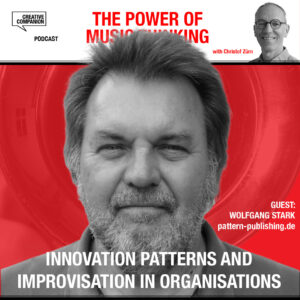This episode is about Innovation patterns and improvisation in organisations. Today, my guest is Prof. Dr. Wolfgang Stark – teacher and researcher specialised in organisational and community psychology and visiting fellow at the Vrije Universiteit in Amsterdam.

With natural sounds, like birds and wind in the background, we talk about how to co-create the sound of a company based on the processes of the organisation and how a jazz band can bring organisational scores to life.
We also talk about the reactable an electronic table that can be played by non-musicians like an instrument to learn co-creation.
We also chat about the difference between learning and organising and the meaning of improvisation in business and society. And we learn how patterns of success translated to a card deck can be used in co-creation, innovation and change. In the end, we hear about the innovative invention of ‘the music box on a garden fence’ that started in corona times.
Listen to the whole episode
Show notes
- Connect with Wolfgang: https://www.linkedin.com/in/wolfgang-stark-0786874/
- Contact via email: wolfgang.stark@stw.de
- Pattern Publishing: https://pattern-publishing.de/
- The New Bank for Community Ideas and Solutions: http://www.ecpa-online.com/new-bank/
- Business Improvisation and Improvisation business
Listen in to a short clip on Agility
The Power of Music Thinking is brought to you by CREATIVE COMPANION
More about The Music Thinking Framework, the Jam Cards and the blog on musicthinking.com
More Episodes of The Power of Music Thinking
- About the Power of Music Thinking Podcast
- A mindset for entrepreneurship, leadership and design with Michael Hendrix from IDEO and Panos Panay from Berklee College of Music
- Music as a Catalyst for Change with Nifemi Aluko, Founder and CEO of kpakpakpa and author of the book Press Play
- Blockchain Philosophy and Collaborative Transformation for Change with Roy Scheerder from Faebric
- Blend sound science with sound art to make sound decisions with Steven Keller
- Deep Listening® with Sharon Stewart, creator of sound works, musician, poet, researcher, piano teacher and deep listener.
- Music and the Brain with Artur Jaschke, neuromusicologist and professor for music-based therapies and interventions
- Cross-pollination in leadership with Ilkka Mäkitalo, musician, teacher, CEO, Co-Founder of Howspace and Conductor of Jyvaskyla Big Band
Keep the podcast and musictinking.com running & ad-free
The most valuable support you can offer is to continue listening and sharing the podcast. For years, my goal has been to share all the ideas from Music Thinking freely and without hassle, and that will never change.
However, if this podcast has sparked an idea, offered a new perspective, or provided a tool you’ve found useful. You can now show your appreciation and help sustain the show through our new Ko-fi page.
Your support, whether a one-time ‘coffee’ or a monthly membership, makes a huge difference. Thank you for being part of this journey. Please buy me a coffee, support Music Thinking on Ko-fi:
https://ko-fi.com/musicthinking


One thought on “Innovation patterns and improvisation in organisations”
Comments are closed.